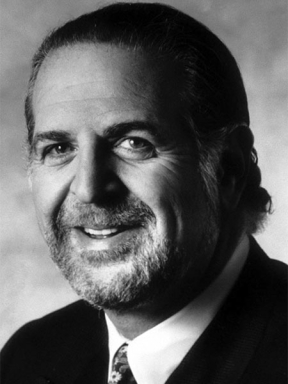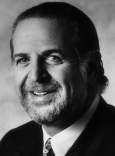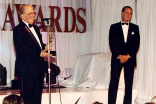Television executive Rich Frank served three terms as President of the Academy of Television Arts & Sciences, from 1985-1987 and 1993-1997.
A native of Bayside, New York, Frank graduated from the University of Illinois and began his career in the 1960s at the advertising agency BBDO in New York City. He then moved to Los Angeles as sales manager at KTLA-Channel 5. He also served as president of KCOP-Channel 13 and Chris-Craft Broadcasting.
From 1977 to 1985, Frank served as vice-president and president of the Paramount Television Group of Paramount Pictures and was one of the founders of the USA Network and served on their board. Under his leadership, television shows such as Cheers, Family Ties and Taxi along with the miniseries Shogun, Winds of War and A Woman Called Golda, (the first non-network movie to receive an Emmy Award) achieved phenomenal success.
In 1985, Frank took over as president of Walt Disney Studios where he was responsible for all production, marketing and distribution of Disney's movies and television shows. This included motion-picture divisions Touchstone, Hollywood Pictures, Miramax and Walt Disney Pictures, resulting in such hits as Pretty Woman, Who Framed Roger Rabbit, Aladdin and The Lion King. He also guided such successful television series as Home Improvement, Golden Girls, Empty Nest and Blossom and launched the Disney Channel, which has grown into a formidable cable network. In addition, he was responsible for Disney's Los Angeles television station KCAL-Channel 9.
In early 1994, Frank spearheaded one of the most ambitious events in the Television Academy's history — the "Information Superhighway Summit," a daylong conference, held at Royce Hall on the UCLA campus that drew many of the most influential executives in the media world — including then-FCC chairman Reed Hundt, as well as Barry Diller, Michael Eisner, Bill Gates, Robert Iger, Robert Johnson, Quincy Jones, Jeffrey Katzenberg, John Malone and Rupert Murdoch — to hear keynote speaker Vice President Al Gore discuss the expanding 500-television-channel universe and new technologies such as the internet. Organized in just six weeks, this was considered a milestone event in bringing focus to the changing industry and the summit made national news, positioning the Television Academy at the forefront of the new media revolution.
The Television Academy also took on anti-drug issues under Frank's leadership. In addition to hosting several daylong seminars, Frank wrote the "Media" section of the White House Commission for a Drug Free America under President Ronald Reagan. First Lady Nancy Reagan hosted and spoke at the main luncheon.
Subsequently, he established the Television Academy's Campaign Against Substance Abuse which dramatically changed the portrayal of drug use in television programming and resulted in a number of specific anti-drug projects, including the landmark Cartoon All Stars to the Rescue. An animated drug-prevention special, the program featured characters from every studio together for the first time from such series as Looney Tunes, Alvin and the Chipmunks, The New Adventures of Winnie the Pooh, Muppet Babies, The Smurfs and others. He was instrumental in arranging for the special to be produced and aired simultaneously on all three broadcast networks which was an unprecedented event in the history of network television. Blockbuster Video offered free rental of the special, which was also distributed through McDonald's restaurants. As a result of their efforts, Frank and others involved in the production were called before a joint Congressional hearing in Washington, D.C., to speak about the project.
n addition, Frank presided over the creation of an indispensable historical resource through his advocacy on behalf of his colleague Dean Valentine, at the time president of Walt Disney and Touchstone Television, and later chairman of the UPN network. In 1996, inspired by the emotional force of Steven Spielberg's Shoah Foundation, which documents stories of the Holocaust through such storytelling methods as vocal histories, Valentine set out to establish something similar for television. Frank, along with Thomas Sarnoff, David Wolper and Grant Tinker, embraced Valentine's idea. The result was the Archive of American Television (now named The Interviews: An Oral History of Television), established under the aegis of the Television Academy Foundation, which has taped unedited video interviews, ranging in length from three to seven hours, with more than 900 actors, writers, producers and other television pioneers and legends.







